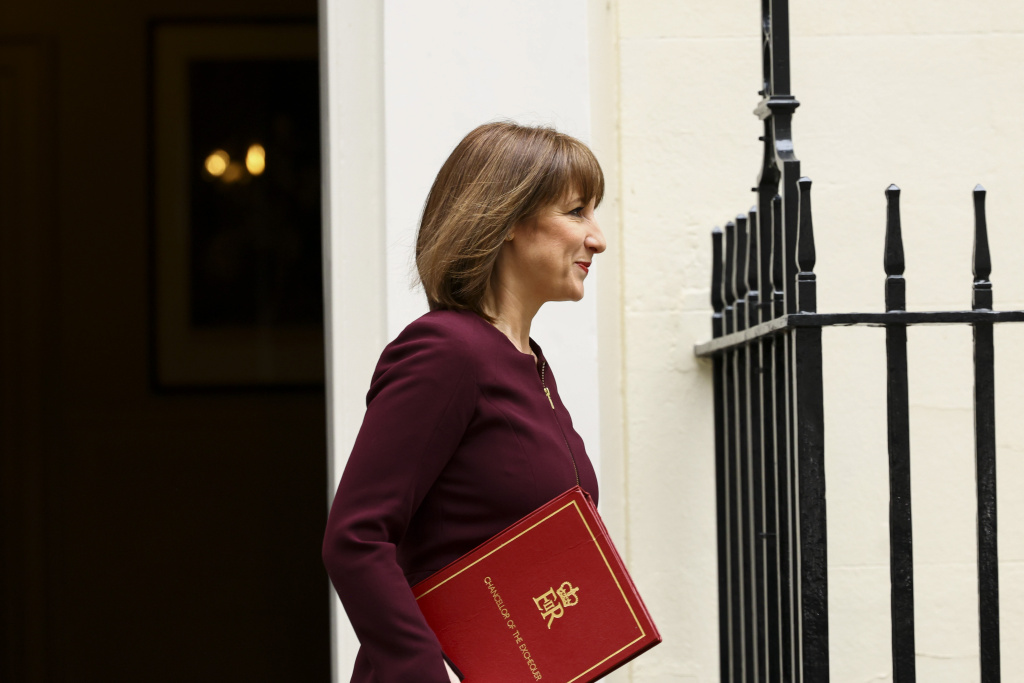When things go wrong, too many people look out of the window, when they should be looking in the mirror. But politicians don’t do mirrors, they do blame, and right now, the government – particularly the chancellor’s – favourite punchbag is the previous lot.
Andy Bell – Illustration by Dan Murrell
Apparently, the Tories left behind a £22bn “black hole”, and now, in the latest chapter of this fairy tale, it’s ballooned to £30bn. If ever a chancellor needed some of Jack’s magic beans….
The official story is that Rachel Reeves was supposed to be the hero who patched things up. She’d stride into the Treasury, slay the dragon of fiscal irresponsibility, and put the UK back on the road to glory.
Instead, she’s less the dragon-slayer and more Gretel, wandering deeper into the fiscal woods with her brother having run out of breadcrumbs.
The problem is obvious: the sums don’t add up. The Labour manifesto had already painted the government into a corner, ruling out rises in the only three taxes that matter – income tax (£305bn), VAT (£172bn) and National Insurance (£171bn).
You can fiddle with corporation tax (£100bn) and shake down the wealthy all you like, but those wells are dry.
So where does that leave the chancellor? Looking under the sofa cushions for spare change. You can slap a surcharge on gambling firms or banks – easy political wins – but you’ll raise just enough to buy a round in the Commons bar.
Capital gains? Property? Dividends? Tempting, but pulling too hard on those levers risks strangling the growth Reeves swears will save us all.
Which brings us to the inevitable U-turn. Treasury boffins are sketching out schemes with the kind of ingenuity normally reserved for prison escapes.
A brave chancellor would grasp the nettle, take the pain now, and reform these big, expensive beasts – but bravery is thin on the ground in Westminster
One rumour is a clever switcheroo: hike income tax, cut National Insurance, and pretend it’s all for the workers.
But workers feel nothing, pensioners and landlords get clobbered, and the government can claim it hasn’t broken its pledge. That’s not fiscal strategy. That’s Penn & Teller with a calculator.
And yet, they might just get away with it. At least once. But sooner or later, the Treasury will be asked to perform another triple-backflip, and then another, because the other two options – borrowing and spending cuts – are politically radioactive.
Borrowing is expensive, and trying to flog more gilts could spook the markets faster than you can say “is that Liz Truss entering the room?”.
Cutting spending? Reeves has already been burned by the fury over welfare cuts, and the words “state pension”, “public sector pensions” and “triple lock” are basically a red button marked “ejector seat.”
A brave chancellor would grasp the nettle, take the pain now, and reform these big, expensive beasts. But bravery is thin on the ground in Westminster these days.
The Treasury is chewing up its time dreaming up wheezes that are politically saleable but economically pointless
Instead, we’re destined for more sticking-plaster economics. More penny-pinching measures dressed up as reform. More Kafka-esque tinkering with Isas and pensions – because nothing says “pro-growth” like making it harder for people to understand where their money’s going.
The tragedy here is that the government could, if it had created some breathing room, have tackled the genuine barriers to investment.
Simplify pensions. Rationalise Isas. Build a tax system you can explain to a normal human without diagrams and a stiff drink. Instead, the Treasury is chewing up its time dreaming up wheezes that are politically saleable but economically pointless.
Unless Reeves finds the courage to cut costs and break her manifesto pledge, she won’t be remembered as the chancellor who rebuilt Britain’s finances – she’ll be remembered as the wicked queen who, when she did look in the mirror to ask the question, “who is the fairest of them all?”, didn’t like the answer.
Andy Bell is the co-founder of AJ Bell

